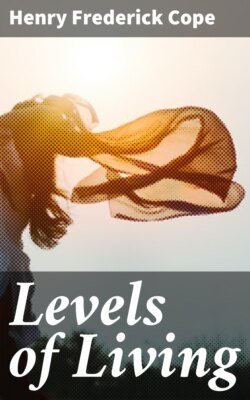Читать книгу Levels of Living - Henry Frederick Cope - Страница 6
На сайте Литреса книга снята с продажи.
LIFE'S UNVARYING VALUES
ОглавлениеTable of Contents
Life is the business of learning to use things as tools, the real as the servant of the ideal, to make conditions even better that character may grow the more, to serve in the making of things and the enduring of things under the inspiration of the full and glorious purpose of life, the realizing of the best for ourselves, the rendering of our best to others.
Only an age that has lost both heart and intellect—the divinely given measuring rods of life—will think of estimating a life by the money measure. It is a shallow world that knows a man as soon as and only when it has scheduled his marketable assets; nor is it a happy augury for a nation when it acquires the habit of estimating its men by the length of the catalogues of their possessions.
A period of outer prosperity is always in danger of being one of inner paralysis. Luxury is a foe to life. Character does not develop freely, largely, beautifully in an atmosphere of commercialism. A moral decline that but presages enduring disaster is sure to succeed the supremacy of the market.
The great danger is that we shall set the tools of life before its work, that we shall make life serve our business or our ambitions instead of causing ambitions, activities, and opportunities all to contribute to the deepening, enriching, and strengthening of the life itself. In the details of making a living it is easy to lose sight of the prime thing, the life; it is easy to forget that the great question is not, what have you? but, what are you?
Life cannot consist in things any more than silk can consist of shuttles, or pictures of brushes and palettes. Life is both process and product; but things and fame and power are no more than the tools and machinery serving to perfect the product. Life must consist in thoughts, experiences, motives, ideals—in a word, in character. A man's life is what he is.
But what a man is will depend on what he does with the things he has or may have. Let him once set the possession of things as his loftiest ideal, let this avarice of things enter the heart and speedily the love of the good will leave. To that god all honour, all truth loving, all gentleness and humanity are sacrificed. When possession becomes life's ruling passion it doesn't take long for principle to be forgotten.
The danger to-day is not that our people will fail in the world's contests because they lack either money, mind, or muscle. We are in little danger from illiteracy or from business incompetency; but we are in danger from moral paralysis, due to undue pressure on the money nerve. We have talked before the youth in the home and amongst ourselves on the street as though the only thing worth living for was money, as though they alone were great who had it and they only to be despised who had it not.
The danger is neither in our market, our commerce, nor our laws; the danger is in our own hearts. No matter how world-potent our merchandise, how marvellous our mechanical and material powers, how brilliant our business strategy, all will not avail to silence the voice, "Thou fool, this night thy soul is required of thee." Then whose shall these things be?
We need, not fewer things, not the return to an age of poverty or dreary destitution; we need more power over things; to let the man, so long buried beneath the money and the lands and houses, come to the top; to set ourselves over our things; to make them serve us, minister to our lives and our purposes in living.
There must be an elevation of standards, the institution of new valuations, clearer, nobler conceptions of what living means. Boys and girls must be taught from the beginning that life is more than self-serving, more than fame or glory; it is the service of humanity. A passion for humanity will cure the passion for gold, will teach the true value of life as something that only the infinite can estimate and will give to the heart those true riches that do not tarnish and that cannot be stolen.
